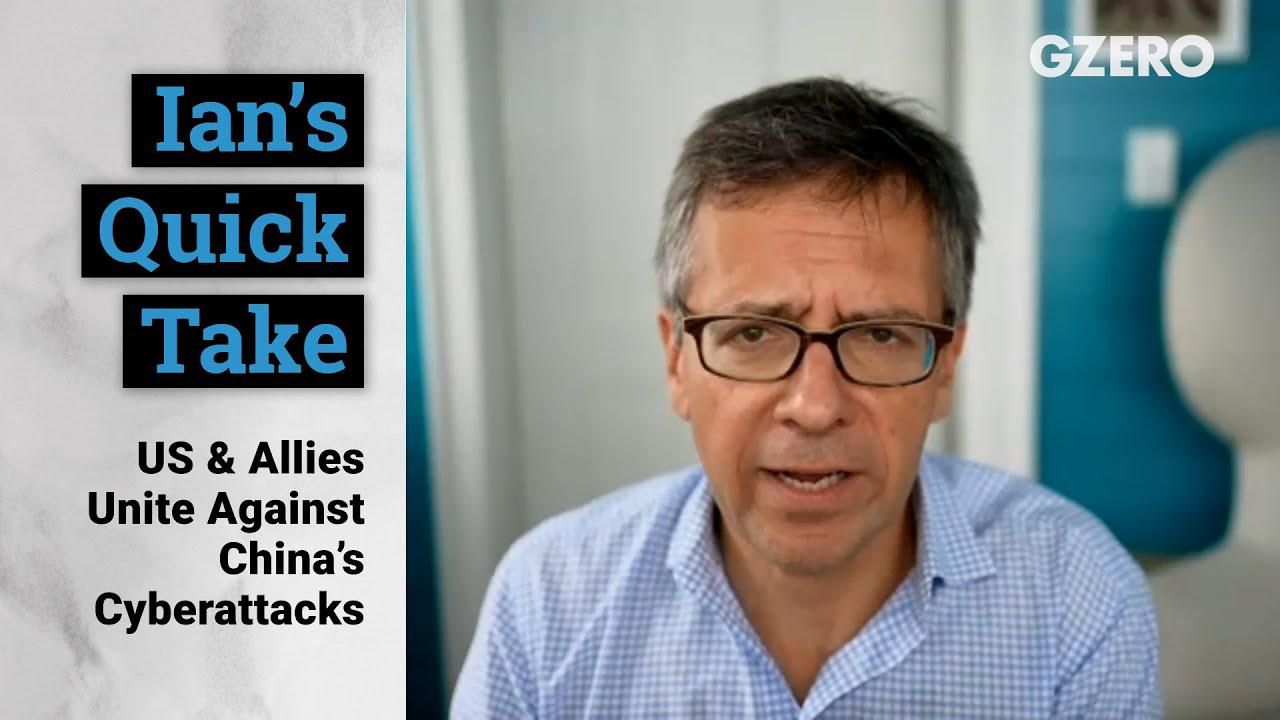Quick Take
US & allies unite against China's cyberattacks

Ian Bremmer: US & Allies Unite Against China's Cyberattacks | Quick Take | GZERO Media

Ian Bremmer's Quick Take:
Hi, everybody. Ian Bremmer here, back in Nantucket for a few days, and a Quick Take to start out the week.Well, I thought I would talk about the finger-pointing happening at China for these cyberattacks. When we've been talking about cyberattacks recently, we mostly talk about Russia. It's been ransomware, it's been espionage, it's been disinformation, and US election intervention and all of these things. But no, this week it is all about China, and specifically the White House had this unusually strong statement, citing concerns about China's, what they call, irresponsible and destabilizing behavior in cyberspace, specifically talking about a hack against the Microsoft Exchange Server that we found out about back in March. That is a big deal.
Second, and related to that, is the fact that there was a massive response, a coordinated response, from NATO, as well as all G7 members. You remember back at the G7 meeting that we had a month ago in the UK, and the surprise was the statement was much more about China, much more coordinated on China, than people would've expected. That was the 3-hour meeting that they shut down the internet so they could all talk internally. There's increasing backlash against what is seen as more assertive Chinese behavior towards the West. We saw the big speech by Xi Jinping at the 100th Communist Party plenum. On the back of that, the Chinese government has made tougher statements on Taiwan, they have taken big moves against Chinese tech companies, against their IPO-ing in the West, in the United States, which is what makes them more transparent and more interoperable and engage in a global way. And now you see the United States and our allies around the world, in turn, taking on more coordination vis-à-vis China.
In the medium-term, one of the biggest questions out there will be to what extent countries like Germany and France and the UK would get on board with the United States that considers its top national security priority to be China, to be a threat from a competitive, assertive, and increasingly powerful China. And what we've seen in last 3 months has been a surprising amount of consolidation of that position. Doesn't mean it's going to continue on that trajectory forever, doesn't mean the Americans will be able to continue to implement on it, but at least for now, what we see is a Chinese government that is looking away from globalization, that's focusing more on domestic supply chain, on domestic consumption, on national champions, and a Chinese model of development, and we're seeing in the United States, Europe, Canada, Australia, Japan, even South Korea, all say we really don't like that direction. We have to work closer together.
Here's the big push back on all of that, and that's, despite all of these headlines, the level of interdependence and interoperability between the West and China continues to be incredibly deep. And you wouldn't necessarily know it by listening to the headlines. Deep in terms of trade, in terms of tourism, in terms of access to each other's markets, access to each other's financial systems, and frankly, most of the major economic actors in the United States in the West over the coming 5, 10 years, they expect to have not only the present level of engagement in China, but even more exposure to the Chinese market. China is the leading trade partner in almost the entire world in 2021. The United States is not about to supplant that. In fact, that trajectory is moving more in that direction.
So, on the one hand, you have the reality of globalization and interdependence that no matter what the politics are, will continue to get stickier and more engaged. On the other hand, you have the politics of pretty much all of the major economies in the world driving exactly against that. It's the most important cleavage in the world today, geopolitically, and it's one we're going to be spending an awful lot of time trying to suss out as these headlines continue to drive this kind of conflict.Anyway, that's it for me today. I hope everyone has a good week. Talk to you all real soon.
On GZERO World, IMF chief Kristalina Georgieva explains to Ian Bremmer why the global economy—and even the eurozone—is proving more resilient than expected.
At the 2026 World Economic Forum in Davos, GZERO’s Tony Maciulis spoke with Ariel Ekblaw, Founder of the Aurelia Institute, about how scaling up infrastructure in space could unlock transformative breakthroughs on Earth.
Who decides the boundaries for artificial intelligence, and how do governments ensure public trust? Speaking at the 2026 World Economic Forum in Davos, Arancha González Laya, Dean of the Paris School of International Affairs and former Foreign Minister of Spain, emphasized the importance of clear regulations to maintain trust in technology.
Will AI change the balance of power in the world? At the 2026 World Economic Forum in Davos, Ian Bremmer addresses how artificial intelligence could redefine global politics, human behavior, and societal stability.